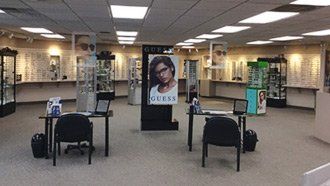See Good, Look Good, Fraser Optical
Serving Greater Detroit
Contact Us
Fraser:
586-293-8888
Richmond:
586-727-7555
Romeo:
586-752-9898
Shelby Township: 586-254-9620
Sterling Heights:
586-977-9010
Oscoda:
989-739-2020
Eye Care Instructions

Locations
With six locations throughout metro Detroit and Oscada, there’s always a Fraser Optical near you!

Special Offers
Fraser Optical makes top-quality eye care for the whole family easy, affordable and fun!
Did You Know 80% of What Children Learn in School Is Through Their Eye Sight?
For school-aged children, Fraser Optical recommends an eye exam every two years if vision correction is not required. For children who wear corrective lenses, a yearly examination is recommended.
If you suspect your child is having vision problems, call and schedule an appointment at one of our six Fraser Optical locations. Our optometrists will thoroughly examine your child's eyes for any potential vision problems.
The eye exam consists of:
If you suspect your child is having vision problems, call and schedule an appointment at one of our six Fraser Optical locations. Our optometrists will thoroughly examine your child's eyes for any potential vision problems.
The eye exam consists of:
- Vision testing (distance and near)
- Eye alignment
- Binocular coordination
- Peripheral awareness
Be sure to inform our doctors of any concerns you may have:
- Constant eye rubbing
- Redness or tearing of the eyes
- Light sensitivity
- Squinting
- Frequent headaches
- Sitting too close to the TV

If your child requires vision correction, Fraser Optical has a large selection of children's frames. For safety reasons, Fraser Optical recommends polycarbonate lenses for all children, especially for those who are very active or play sports. Polycarbonate is a shatterproof plastic used to make thin, light lenses.
A good tip to help children adjust to wearing glasses is to allow them a say in their frame selection. This way they will feel more comfortable and likely be more compliant wearing glasses.
Remember, early exams are important to make sure your child has the basic skills related to good eyesight so they can perform better in school.
Eye Care Instructions for People Using Computers
Spending long hours in front of a television or computer is part of many people’s lives today. Here are some useful eye care tips for computer users:
- After every 20-30 minutes of work, look at a distant object and blink several times. This will help in better focusing.
- Blink frequently. People tend to blink less while working on a computer, which can lead to dry eyes. Try to blink 12 to 15 times every minute.
- Exercise your eyes at frequent intervals. Eye exercise is simple. All you need to do is just blink several times, then close your eyes and roll them in clockwise and counter clockwise direction. While doing this, inhale and exhale slowly. Open your eyes slowly after doing this.
- Rub your palms against each other until they become warm. Cover your eyes with your warm palms for about a minute.
- Splashing water on your face during breaks can keep you refreshed.
- A few minutes of walking during breaks will refresh your body and mind. It is also good for your eyes, as walking increases blood supply to your eyes.
- Use an antiglare screen – attach it to your monitor or use antiglare glass while working on computers. Also, position the monitor and lights in such a manner that glare from the screen is minimal.
Submitted by: Robin Stefani
What Is Pink Eye?
Pink eye, or conjunctivitis, is redness and inflammation of the membranes covering the whites of the eyes and inner portion of the eyelids. Pink eye may be either infectious or noninfectious.
Infectious pink eye
can be caused by bacteria or viruses. Viral and bacterial forms of conjunctivitis are common in childhood but can occur at any age.
Noninfectious pink eye
can be caused by allergy, chemical irritation, underlying inflammatory diseases or trauma.
Infectious forms of pink eye are highly contagious and are spread by direct contact with infected people. If you or your child has infectious pink eye, avoid touching the eye area and wash your hands frequently, particularly after applying medications to the eye area. Never share towels or handkerchiefs, and throw away tissues after each use. Disinfecting surfaces like countertops, sinks and doorknobs can also help prevent the spread of infectious pink eye.
Viral pink eye
symptoms include:
- Watery discharge (does not have a "color")
- Sinus congestion and runny nose are often present
- Eyelids may be swollen
- Sensitivity to bright light may last one to two weeks, with symptoms being pronounced the first three to five days after symptoms first appear
- While viral pink eye may not require an antibiotic, Fraser Optical recommends that you schedule an appointment immediately to rule out an infection of the cornea, which is occasionally associated with this type of pink eye. Viral pink eye is most common in the late fall and early spring.
Bacterial pink eye
symptoms include:
- Eye pain
- Swelling
- Itching
- Redness
- Swollen lymph nodes
- Moderate to large amount of discharge, usually thick and yellow to green in color
The discharge accumulates while sleeping. The affected person may awaken to find their eyes are stuck shut. A warm, moist cloth applied to the eyes will remove the discharge with repeated applications of the warm, moist cloth to the eye.
If you feel you or your child might have bacterial pink eye, it is very important that you schedule an appointment with Fraser Optical immediately for several reasons. First, if the cause is a bacterial infection, an antibiotic will be needed to help your immune system to kill this infection. Secondly, if you are experiencing other symptoms such as a runny nose, cough, earache, etc., there is a good chance that these symptoms are caused by the same bacteria, and an oral antibiotic may also be needed to treat this infection, along with the antibiotic drops or ointment for the eyes.
Infectious forms of pink eye are highly contagious and are spread by direct contact with infected people. If you or your child has infectious pink eye, avoid touching the eye area and wash your hands frequently, particularly after applying medications to the eye area. Never share towels or handkerchiefs, and throw away tissues after each use. Disinfecting surfaces like countertops, sinks and doorknobs can also help prevent the spread of infectious pink eye.
Allergic pink eye
symptoms include:
- Intense itching
- Tearing
- Swelling
Allergic pink eye is frequently seasonal and accompanied by other typical allergy symptoms such as sneezing, itchy nose or scratchy throat.
Cold, moist washcloths applied to the eyes and over-the-counter decongestant eye drops can provide relief. The doctors at Fraser Optical can prescribe stronger medications if these home remedies are not adequate.
You should not wear contact lenses until the pink eye has resolved. Our doctors at Fraser Optical can offer guidance about when it is safe to resume the use of contact lenses. Eye makeup and cosmetic creams should also be avoided in the eye area until your symptoms have resolved.
Chemical pink eye
can result when any irritating substance enters the eyes.
Common irritants are:
- Household cleaners
- Sprays of any kind
Prompt, thorough washing of the eyes with very large amounts of water is very important if an irritating substance enters the eye. Contact our doctors at Fraser Optical or your local poison control even if you think the irritant or chemical is safe, as some of the most common household products like bleach and furniture polish can be very damaging.
For more information and to view a slideshow on pink eye, visit http://www.medicinenet.com/pink_eye_pictures_slideshow/article.htm
Summertime Eye Protection
Summer is a time to get outside and enjoy some of our favorite sports and other physical activities. The fresh air and natural light are great for our overall health, including our eyes. While indulging in all the fun the summer brings, the following are things to keep in mind to maintain healthy vision during the summer months.
Protect your eyes from harmful UV rays. According to the American Optometric Association, only 28% of the 2013 American Eye-Q survey respondents said UV protection is the most important factor when buying sunglasses. Not all sunglasses offer adequate UV protection. Fraser Optical offers sunglasses that block out UV-A and UV-B radiation.
Growths on the eye, such as pterygium, can show up in our teens or twenties, especially in surfers, skiers, fishermen, farmers or anyone who spends long hours under the mid-day sun or in the UV-intense conditions found near rivers and mountains. Sun damage to eyes can occur anytime during the year, not just in the summertime, so be sure to wear UV-blocking sunglasses and broad-brimmed hats whenever you're outside.
Follow These Tips to Protect Your Eyes From the Sun All Year Long
- Don't be fooled by clouds. The sun's rays can pass through haze and thin clouds.
- Never look directly at the sun. Looking directly at the sun at any time, including during an eclipse, can lead to solar retinopathy, which is damage to the eye's retina from solar radiation.
- Don't forget the kids and older family members. Everyone is at risk, including children and senior citizens. Protect their eyes with hats and sunglasses.
- To judge the quality of nonprescription sunglasses, look at something with a rectangular pattern, such as floor tile. Hold the glasses at a comfortable distance and cover one eye. Move the glasses slowly from side to side, then up and down. If the lines stay straight, the lenses are fine. If the lines wiggle, especially in the center of the lens, try another pair. Fraser Optical offers a variety of sunglasses from many designer name brands at prices to fit any budget. Prescriptions lenses can be made if so desired.
Summertime Eye Protection
Summer is a time to get outside and enjoy some of our favorite sports and other physical activities.
What Is Pink Eye?
Pink eye, or conjunctivitis is redness and inflammation of the membranes covering the whites of the eyes and inner portion of the eyelids. Pink eye may be either infectious or noninfectious.
Eye Care Instructions for People Using Computers
Spending long hours in front of a television or computer is part of many people’s lives today.
Did You Know…?
Fraser Location
32925 Groesbeck Highway
(At 14 Mile Road)
Fraser, MI 48026
Phone:
586-293-8888
Fax:
586-859-0233
Business Hours:
Monday, 9 a.m.-7 p.m.
Tuesday, 9 a.m.-6 p.m.
Wednesday, 9 a.m.-6 p.m.
Thursday, 9 a.m.-7 p.m.
Friday, 9 a.m.-6 p.m.
Saturday, 8 a.m.-2 p.m.
Sunday, closed
Richmond Location
67205 Main St.
(at Gratiot)
Richmond, MI 48062
Phone: 586-727-7555
Fax: 586-248-5056
Business Hours:
Monday, 9 a.m.-6 p.m.
Tuesday, 9 a.m.-6 p.m.
Wednesday, 9 a.m.-4 p.m.
Thursday, 9 a.m.-7 p.m.
Friday, 9 a.m.-6 p.m.
Saturday, 8 a.m.-2 p.m.
Sunday, closed
Romeo Location
71150 N. Van Dyke
(Fiddlers Cover Shopping Center)
Romeo, MI 48065
Phone:
586-752-9898
Fax:
586-372-8905
Business Hours:
Monday, 9 a.m.-6 p.m.
Tuesday, 9 a.m.-7 p.m.
Wednesday, 9 a.m.-4 p.m.
Thursday, 9 a.m.-7 p.m.
Friday, 9 a.m.-6 p.m.
Saturday, 8 a.m.-2 p.m.
Sunday, closed
Shelby Township Location
51026 Van Dyke
(At 23 Mile NE Corner)
Shelby Township, MI 48316
Phone:
586-254-9620
Fax:
586-884-7867
Business Hours:
Monday, 9 a.m.-7 p.m.
Tuesday, 9 a.m.-6 p.m.
Wednesday, 9 a.m.-4 p.m.
Thursday, 9 a.m.-7 p.m.
Friday, 9 a.m.-6 p.m.
Saturday, 8 a.m.-2 p.m.
Sunday, closed
Sterling Heights Location
3602 15 Mile Road
(West of Ryan Road)
Sterling Heights, MI 48310
Phone:
586-977-9010
Fax:
586-413-7870
Business Hours:
Monday, 9 a.m.-7 p.m.
Tuesday, 9 a.m.-4 p.m.
Wednesday, 9 a.m.-6 p.m.
Thursday, 9 a.m.-7 p.m.
Friday, 9 a.m.-6 p.m.
Saturday, 8 a.m.-2 p.m.
Sunday, closed
Oscoda Location
211 N. State St.
Oscoda, MI 48750
Phone:
989-739-2020
Fax:
989-569-5056
Business Hours:
Monday, 9 a.m.-5 p.m.
Tuesday, 9 a.m.-7 p.m.
Wednesday, 9 a.m.-5 p.m.
Thursday, 9 a.m.-5 p.m.
Friday, 9 a.m.-5 p.m.
Saturday, 9 a.m.-1 p.m.
Sunday, closed
Fraser Location
32925 Groesbeck Highway
(At 14 Mile Road)
Fraser, MI 48026
Phone:
586-293-8888
Fax:
586-859-0233
Business Hours:
Monday, 9 a.m.-6 p.m.
Tuesday, 9 a.m.-6 p.m.
Wednesday, 9 a.m.-6 p.m.
Thursday, 9 a.m.-7 p.m.
Friday, 9 a.m.-6 p.m.
Saturday, 8 a.m.-2 p.m.
Sunday, closed
Richmond Location
67205 Main St.
Richmond, MI 48062
Phone:
586-727-7555
Fax:
586-248-5056
Business Hours:
Monday, 9 a.m.-6 p.m.
Tuesday, 9 a.m.-6 p.m.
Wednesday, 9 a.m.-4 p.m.
Thursday, 9 a.m.-7 p.m.
Friday, 9 a.m.-6 p.m.
Saturday, 8 a.m.-2 p.m.
Sunday, closed
Romeo Location
71150 N. Van Dyke
(Fiddlers Cover Shopping Center)
Romeo, MI 48065
Phone:
586-752-9898
Fax:
586-372-8905
Business Hours:
Monday, 9 a.m.-6 p.m.
Tuesday, 9 a.m.-6 p.m.
Wednesday, 9 a.m.-4 p.m.
Thursday, 9 a.m.-7 p.m.
Friday, 9 a.m.-6 p.m.
Saturday, 8 a.m.-2 p.m.
Sunday, closed
Shelby Township Location
51026 Van Dyke
(At 23 Mile NE Corner)
Shelby Township, MI 48316
Phone:
586-254-9620
Fax:
586-884-7867
Business Hours:
Monday, 9 a.m.-6 p.m.
Tuesday, 9 a.m.-6 p.m.
Wednesday, 9 a.m.-4 p.m.
Thursday, 9 a.m.-7 p.m.
Friday, 9 a.m.-6 p.m.
Saturday, 8 a.m.-2 p.m.
Sunday, closed
Sterling Heights Location
3602 15 Mile Road
(West of Ryan Road)
Sterling Heights, MI 48310
Phone:
586-977-9010
Fax:
586-413-7870
Business Hours:
Monday, 9 a.m.-6 p.m.
Tuesday, 9 a.m.-4 p.m.
Wednesday, 9 a.m.-6 p.m.
Thursday, 9 a.m.-7 p.m.
Friday, 9 a.m.-6 p.m.
Saturday, 8 a.m.-2 p.m.
Sunday, closed
Oscoda Location
211 N. State St.
Oscoda, MI 48750
Phone:
989-739-2020
Fax:
989-569-5056
Business Hours:
Monday, 9 a.m.-5 p.m.
Tuesday, 9 a.m.-7 p.m.
Wednesday, 9 a.m.-5 p.m.
Thursday, 9 a.m.-5 p.m.
Friday, 9 a.m.-5 p.m.
Saturday, closed
Sunday, closed
Content, including images, displayed on this website is protected by copyright laws. Downloading, republication, retransmission or reproduction of content on this website is strictly prohibited. Terms of Use
| Privacy Policy


